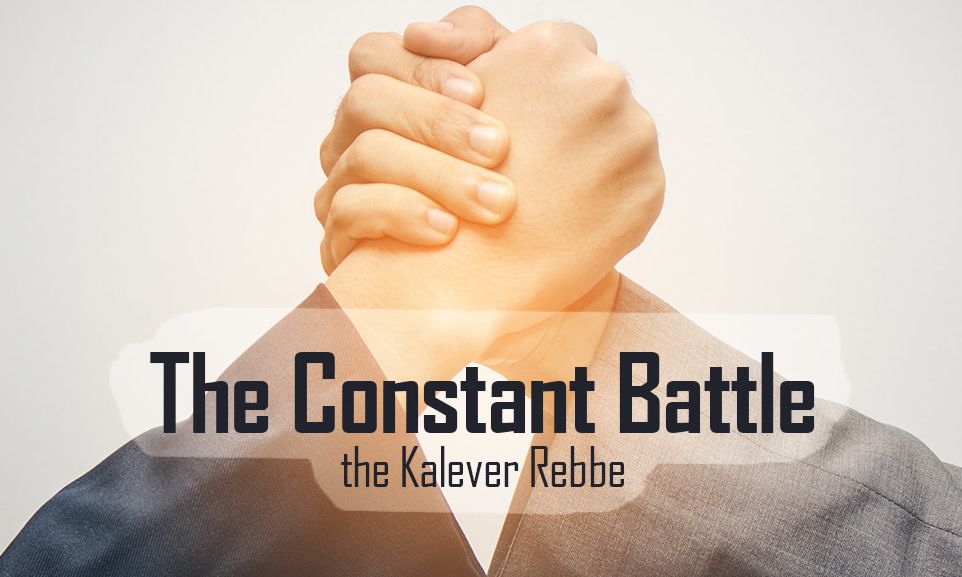
The Constant Battle
Helping or hurting? Merciful or cruel? We have a constant battle within ourselves to decide if our “good deed” is truly good or if it will end in tragedy.

“It was Joseph who fed the entire populace of the land” (Breishit 42:6)
Overcoming Challenges
When Rabbi Mordechai of Chernobyl, z”l, started to become gravely ill and his time to leave this world was near, he ordered that he should be taken to the city of Kiev. While on the way to Kiev, the Rebbe and his entourage stop in the city of Anetivka. The Rebbe told his Chassidim that they didn’t need to travel any further.
There was one young man who was buried in the town’s cemetery and, through Divine insight, the Rebbe saw a tremendous, holy light coming from this man’s grave. And, the Rebbe wanted to be buried in this town, near the light emanating from the grave of this bachur, this young man.
When the Rebbe passed away, the Chassidim did as they were asked.
However, the Chassidim were curious and asked the townspeople about this bachur, this young man, who was buried there. The townspeople told the Chassidim the story of this man:
The young man was a tailor in the town. He was handsome beyond comparison. One time, he was commissioned to do some work by the town’s municipal minister, who wasn’t Jewish. While working there, the minister’s sole daughter took a strong liking to the man and constantly tried to seduce him. However, the man rejected her seductions, saying that he was a yid (a Jew) and had to remain true to Hashem and His mitzvot. He couldn’t even contemplate violating the will of Hashem.
When this young woman realized that she could not seduce this man, that her desires were being denied, she fell physically ill. Her illness became grave. She explained to her father why she was ill and how the denial of her desire was literally killing her. Her father, wanting to ease the suffering of his only daughter, brought this man to her room, where his daughter lay there immodestly dressed. The minister promised the man wealth, riches, and stature if he just helped his daughter by giving into her seductions. Then he closed the door.
However, this man was committed to Hashem and His Torah. He wasn’t going to allow himself to be seduced by the daughter or the promises of riches and fame. Instead, he turned to the wall and refused to even look at the woman.
After she tried over and over again to seduce him, she died of despair and longing.
When the father came back and opened the door, he found his only daughter dead on the floor. Enraged, he beat the Jewish man to death. And his pure soul left his body and ascended to the heavens.
When the Chassidim heard this incredible story, they understood what their Rebbe saw, why there was such a holy light coming from that cemetery. They understood that even though this man was a simple tailor, his fortitude and commitment to Hashem, his ability to withstand such an enormous test and challenge, raised his soul to the highest level of holiness.
This man faced a personal challenge. The yetzer hara (evil inclination) tempted him first with the seductions of the woman. And then, he challenged him by trying to make him have pity on the poor sickly girl. The yetzer hara tried to appeal to his goodness, and to create the scenario where the man would bend a little bit to simply ease the woman’s suffering. But this yid remained steadfast.
The mistake of Psychologists
A similar incident is related to us in the Gemara (Sanhedrin 75b):
A man, who was controlled and imprisoned by his lustful desires, once desired a particular woman so strongly that he became ill. The psychologist explained that it would be impossible for this man to be cured without giving in to this desire. The rabbis, however, forbade it saying that the laws of Torah must be upheld, even if it would eventually lead to this man’s death, since illicit relations is one of the three sins one should give up his life before violating.
The doctors reconsidered and explained to the rabbis that perhaps the man can indulge partially, fulfilling only some of his desires, and that might be enough to cure him. Once again, the rabbis said in no uncertain terms, the laws of purity and illicit relationships must be upheld.
Whatever became of this man? The Midrash explains (cited by Rashi in Sanhedrin 31b) that this man spent a long time contemplating his challenge. He came to the realization that eternity in the World to Come was worth more to him than a few moments of fleeting pleasure in this world. He overcame his desire, defeated his yetzer hara, and had a complete physical recovery. A light of tremendous holiness was bestowed upon this man, and he became one of the leading sages, referred to throughout the Gemara as “Mar Ukbah“.
There is a tremendous lesson in this story. Often, we become susceptible to feel bad for someone else, to feel empathetic. Our desire to help ease someone’s suffering, however, cannot come at the cost of violating Hashem’s Torah and Mitzvot. We cannot allow our mercy for other to lead to spiritual downfall.
The Baal Shem Tov and His Guard
My holy ancestor Reb Eliezer Tzvi from Komarna, wrote in his book “Zakein Beito” (41:23) that the Baal Shem Tov used to keep an animal in front of his home to keep away the groups of beggars that would travel from town to town. These beggars in the time of the Baal Shem Tov used to lead lives that were contrary to Torah and Mitzvot. The Baal Shem Tov explained that by providing them with money and help to go on with their travel, you would be supporting the continuation of a lifestyle that is contrary to what Hashem wants in this world.
The lesson from this is, your mercy should not lead to your spiritual downfall or to that of others.
Starving Temptation
Actually, the biggest favor you can do for a person with bad desires, is to help him not to give in to these desires.
It is a tremendous avodah, work, to resist giving into temptations. It isn’t easy. It is a struggle. However, through that difficulty, through that struggle, through withstanding temptation, one can achieve eternal goodness. Not only spiritually, but physically in this world as well. He can avoid further hardships and challenges sent to him by Hashem to rectify his behavior. Hardships that can come in the form of his livelihood, his family etc. By staying true to Torah and Mitzvot, by withstanding temptation, he can avoid the hardships that are sent as course corrections.
Also, naturally one has a much better life when resisting his temptations. Like Chazal explains in Succah (52b): there is a general rule that you are “satiated from hunger” – meaning that starving satiates. When you try to satiate a desire, a temptation, it only leads to stronger desires for other things. Giving in to one temptation will inevitably lead to a powerful desire for other, new, and different temptations. However, when you withstand temptation, when you don’t satiate your desires, when you leave those desires “starving”, only then can you achieve true serenity and a sense of peace and satiation. Starving the desires leads to a fulfilled life.
Yosef Taught the Populace
Yosef was a Tzadik who, throughout his life, withstood the most severe and extreme temptations. He was tested like no other when the wife of Potifar fell ill by her desire to him, and she begged him to have mercy on her and indulge at least partially to fulfill some of her desires. Yet, he remained steadfast in his commitment to Hashem. And Yosef taught this to those around him.
This is what the pasuk is teaching us: “It was Joseph who fed the entire populace of the land”. He taught them how to find true satiation in their lives; by overcoming life’s temptations.
May every yid find the strength to overcome their temptations. To withstand the blatant trickery of the yetzer hara, to hold on to the emet, the truth, at all times. To realize that – even when something seems like a “good deed”, like you are helping someone else, that, too, might be the trickery of the yetzer hara. Through this strength, may every yid feel satiated in their lives through the blessings Hashem bestows upon them. Amen.











